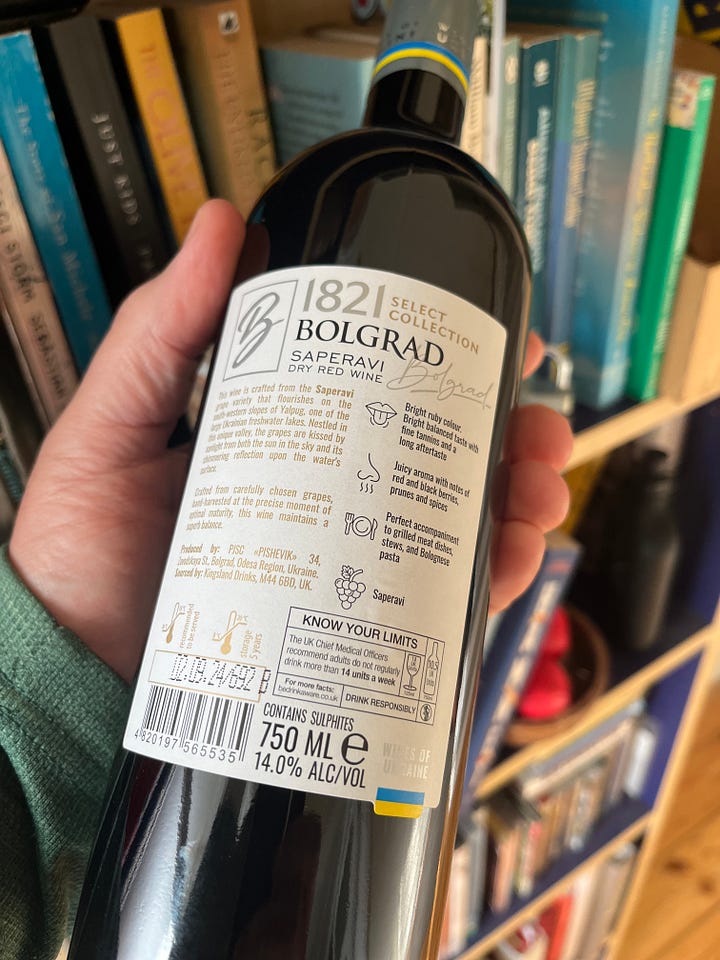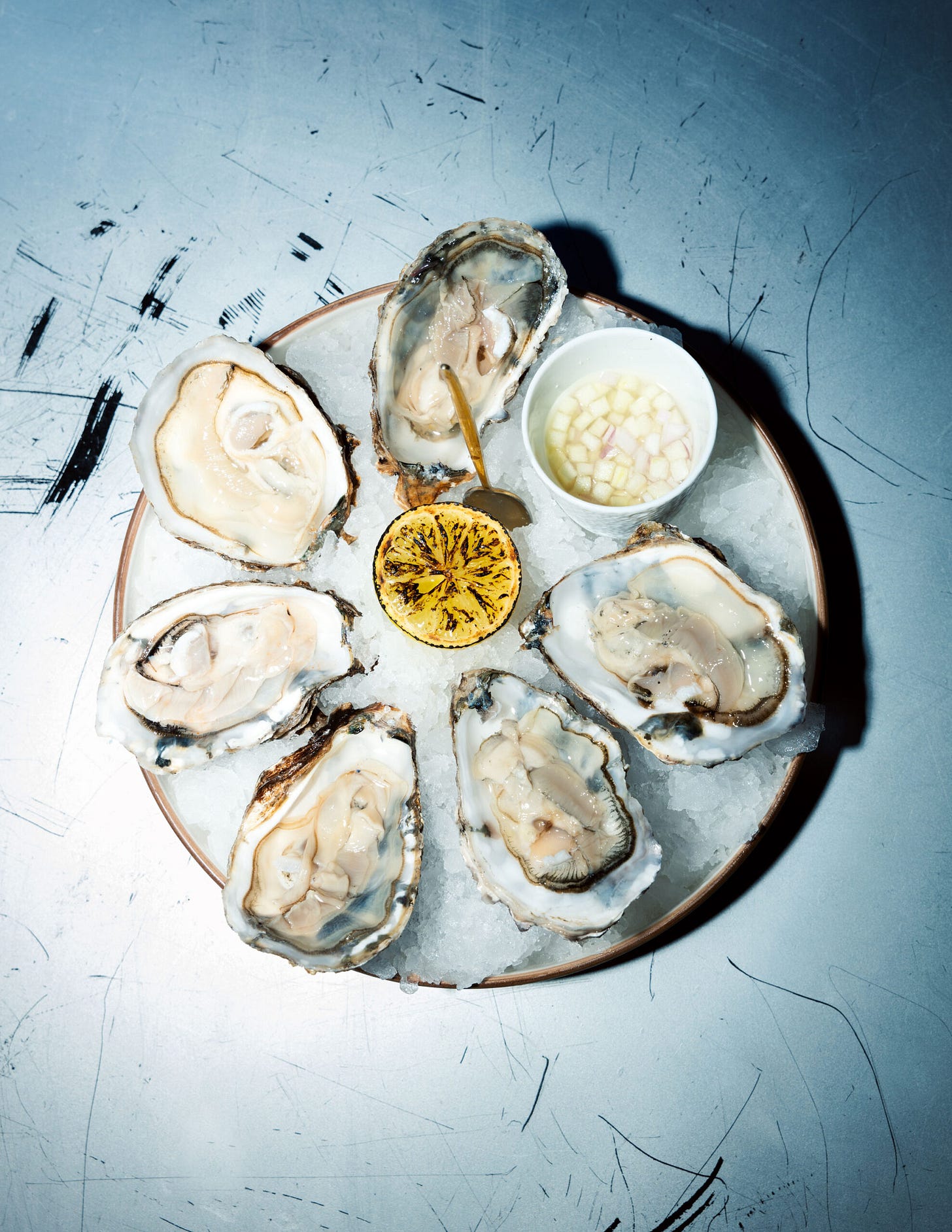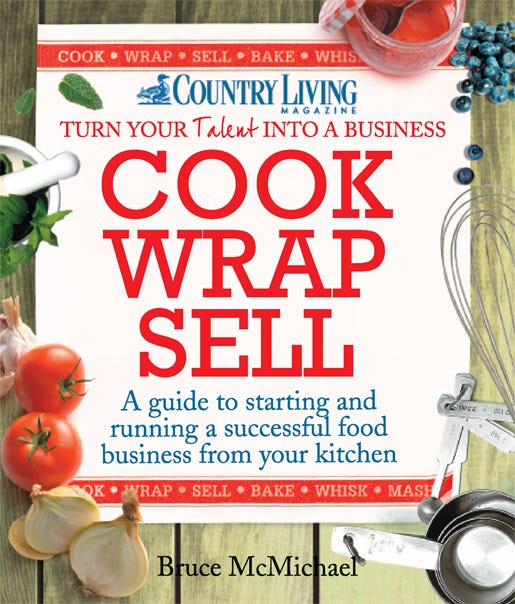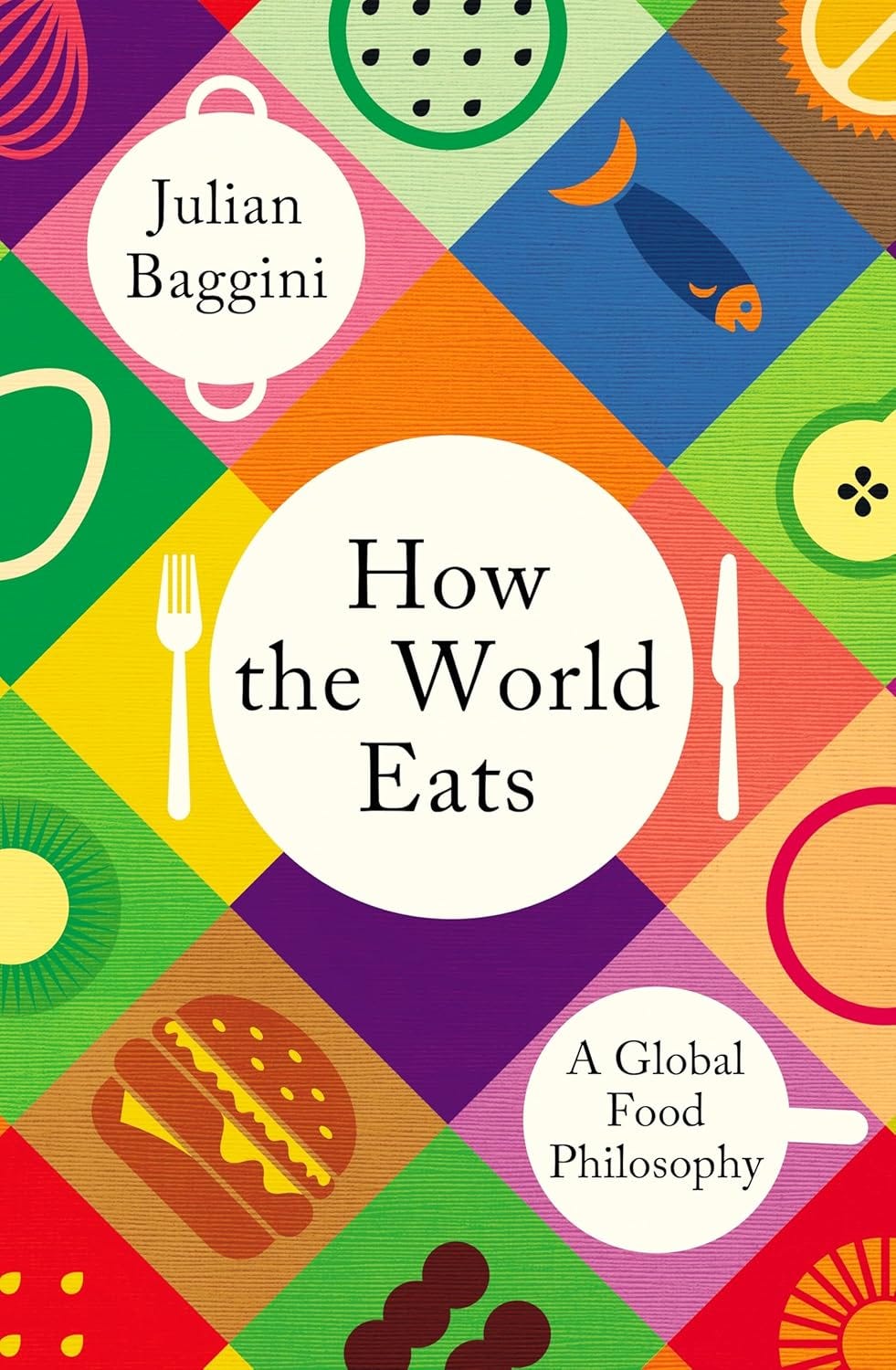A surprise result and Danish oysters
Hello Lemonistas,
Welcome to your latest edition of The Lemon Grove newsletter. In this issue, we offer some thoughts on the recent US election and look at a new book for Danish-reading oyster lovers!
'One has to live, you know. You can't just die from grief or anything,' wrote food writer MFK Fisher. "You don't die, you might as well eat well, have a good glass of wine, a good tomato'. Fisher, the US-born food writer, spoke these words some 90 years ago while speaking to a journalist after publishing her book 'How to Cook a Wolf'.
Such was my disquiet after this week's US presidential election that I flinched when the heading from a recipe email from The Guardian newspaper started … 'Keep calm …' It was about the festive storm of Christmas! Then, an email from US-based podcast host Mel Robbins was headlined, 'I know why he does it ...' The post was about her Australian Shepherd dog Yolo. Apparently, he watches the sun go down each evening with an evident sense of awe.
The world changed after the US election results were announced last week. Millions of words have already been written about the incoming president and his worldview. Billions more will be written over the coming four years, with social division just one result. The dignity with which Kamala Harris and the Democrats conceded defeat is in marked contrast with the attempted insurrection of 2021.
Some say keep politics out of the workplace, out of sport (boycotts of Apartheid-era South Africa, and Moscow Olympics of 1980), out of music (thankfully, Midge Ure and Bob Geldorf ignored the calls and created Live Aid) and banning it from dinner table conversations along with sex and religion. Politics, policy and personalities are everywhere and must be discussed, debated and understood. Even if the person you are talking with cannot see your point of view, compromise or understand the broader picture. This is not the time for complacency.
So why is politics being written about here? After all, The Lemon Grove is a food culture newsletter. Well, president-elect Donald Trump is a climate change sceptic and has threatened to pull the US out of international agreements such as the Paris Agreement of 2021, which covers climate change mitigation, adaptation, and finance. Recent catastrophic floods have devastated citrus harvests in central Florida, US and in the orange groves of Valencia, Spain. A Reuters news report noted that "We are facing a catastrophe ... the losses will be in the millions (of euros)," said Ricardo Bayo, secretary of the Union of Small Producers (UPA) in Valencia. Another farming group, the Valencia Farmers' Association, said 'orange, persimmon and mandarin crops were among those that would be lost'. The Valencia region accounts for nearly two-thirds of citrus fruit production in Spain - the world's top exporter of oranges. This year's UN Climate Change Conference COP29 runs from 11 – 22 November in Baku, Azerbaijan. Climate change, struggling food systems and feeding the world's people are intimately linked and under severe political, economic and environmental pressures.
There's much to consider. There is also a need to understand the reasons for the vote. While I do that, and no doubt have animated discussions with the odd friend and family member, I have just bought a bottle of Ukrainian wine (never seen it before) in a selfish gesture of solidarity.


Buckle up, Lemonistas. It's going to be one hell of a ride. The Lemon Grove will be there with you, offering ideas to make your community eat well, cook well and enjoy the bittersweet tastes of citrus fruits, including oranges from Florida.
Danish Oysters
Just about every recipe has citrus as an ingredient, the youthful Danish chef Jonas Harboe Frederiksen tells me as his first book, 'Pink Oyster' (in Danish language only at present), is launched. Citrus is a natural pairing for oysters. Jonas' grapefruit pickle offers a complex mix of being deeply sweet, warming, fresh, bright and simply delicious.
Jonas is one of Denmark's rising culinary stars and is making oysters one of his signature dishes. We first met a few years ago at the Danish Oysters Festival in Rømo on Denmark's beautiful, if occasionally bleak, western coast.
Danish waters play host to two types of oysters: the invasive giant oyster (Pacific oyster) and the local, flat Limfjord oyster.
The oyster divides the waters among the Danes' taste buds, but the book Pink Oyster will hopefully bring the two sides together. With its collection of inspiring recipes, the book acts as a manifesto that aims to bring oysters into focus and open up new taste experiences for the uncertain. Use it as a reference work, a guide or just as inspiration - regardless of whether you are seasoned oyster cook or a beginner. You will find both classic recipes from French cuisine and recipes at the more experimental and challenging end within its pages.
The cookbook also offers contributions from six of Denmark's best chefs, who combine to map out the oysters' endless culinary possibilities. The roll call of oyster enthusiasts include Elisabeth Madsen, dessert and pastry chef at Falsled Kro; Julian Elkjær, formerly King Hans and now head chef at Salon Magnus Brandenburg Carlsen, assistant chef at Alchemist.
"If I understand Jonas correctly, his mission is to make oysters a part of Danish cuisine and eradicate the myth that it is a luxury for the few ... because Jonas does not treat it as an untouchable star, but embraces it like a friend, writes Danish journalist Martin Kongstad, in the book's foreword.
Here's some of what I wrote when I first met Jonas about this time back in 2021 … “Boiling slivers of grapefruit seven times in clean, fresh water before adding honey and fermenting the mix for several months may seem obsessive, but for one up-and-coming Danish chef it was a vital matter of time, experimentation and discovery.
“I'm talking with Jonas Harboe Frederiksen at the Danish Oyster Festival, which takes place over a long weekend in southeastern Denmark. It's an ever-changing seascape of land reclamation, salt marsh lamb, and, sadly, thousands of tonnes of aggressive, invasive oysters that are thriving in this all-you-eat buffet of native oysters, mussels and shrimp.
“So the ever-practical Danes thought, let's have a festival where people eat thousands, watch shucking competitions, enjoy new recipes created by local and international chefs and get people eating these invaders to save the natives.
“Over the weekend, Jonas shucked dozens of oysters for tasting, using his potions, ferments and pickles … grilled fig leaf oil, pickled mulberries and 'Nordic wasabi', his foraged horse radish!
“Citrus is a natural pairing for oysters. Jonas' grapefruit pickle was a complex mix of deeply sweet, warming, fresh, bright and simply delicious textures and flavours.”
OYSTERS WITH KOMBU, CHINESE RADISH AND COAL OIL
Jonas has kindly shared this recipe with us, which is one steeped in history. An oyster in black shades and with Japanese flavours created in connection with a charity running the vast, decommissioned public waters cisterns in the city's Frederiksberg suburb. Once Copenhagen's underground water reservoir, it's now an exhibition site and museum. The Danish palette likes salty notes, as seen, for example, in the nationally popular snack of liquorice.
12 oysters
75 gm bladderwrack (edible seaweed)
4 pieces of finger lime (aka, lime caviar)
50 gm kombu vinegar
50 gm umeshu (Japanese plum vinegar)
50 gm mirin
Splash of soy
Pinch of salt
50 gm Extra virgin olive oil
1 tsp Activated charcoal
¼ Chinese radish, Daikon
12 oysters
Red sorrel or red shiso
Kombu mignonette
Measure out 1 litre of water and add 1 tbsp salt to create a brine à la seawater. Pour half into a pan and half into a bowl filled with ice cubes. Blanch fresh seaweed in boiling brine for 10-30 seconds, depending on thickness. The seaweed will naturally turn green. Transfer the bladderwrack to a bowl layered with ice cubes to stop the cooking. Strain out the cooled seaweed and cut it into small brunoise.
Cut finger limes in half, squeeze out citrus pearls, and mix with seaweed and the other ingredients. Season with a dash of soy.
Coal oil and Chinese radish crudité
Whisk olive oil and charcoal together to create a 'coal, or charcoal oil'. Let it steep for 1 hour until the oil is jet black. Strain off the charcoal.
Cut Chinese radish thinly on a mandolin, cut out with a biscuit cutter and place in a bowl of water and ice cubes until crisp. You can use another shape if you don't have such a cutter.
Serving
Each oyster is prepared with 1 tbsp kombu mignonette, a Chinese radish leaf and 4-5 drops of coal oil. Finish each oyster with a leaf of sorrel or red shiso.
NB. Finger lime can be replaced with citrus juice and plum vinegar with another similarly coloured vinegar.
We’re on Etsy
The Lemon Grove has landed on the giant online shopping website Etsy and will be building up stock and lots of lemony, foodie books, cooking tools and kitchenalia.
We've just opened our Etsy shop, and it's the place to buy my book, 'Cook Wrap Sell: A guide to starting and running a successful food business from your kitchen'. More culinary items and citrusy goods will be added regularly.
Cultural bites: images, words, textures
How the World Eats: A Global Food Philosophy
by Julian Baggini
Published October 10, 2024. Buy the book here.
How we live is shaped by how we eat. You can see this in the vastly different approaches to growing, preparing and eating food around the world, such as the hunter-gatherer Hadza in Tanzania, whose sustainable lifestyle is under threat in a crowded planet, or Western societies whose food is farmed or bred in vast intensive enterprises. Most of us now rely on a complex global food web of production, distribution, consumption and disposal, which is now contending with unprecedented challenges. Philosopher and writer Julien Baggini takes a long view into what and why we eat certain foods, our cultural relationship with eating and how farming and consumption are changing under the impact of new technology.
Best wishes
Bruce
The Lemon Grove's Substack newsletter
Give the gift of a 'The Lemon Grove' Substack newsletter to a friend, family member or yourself! Organise your gift through the link below … Thank you.
Bruce McMichael
Writer, Podcaster, Event Host & Cook, Lemonista
Facebook: LemonGroveSocial
Instagram: LemonGrovePics






